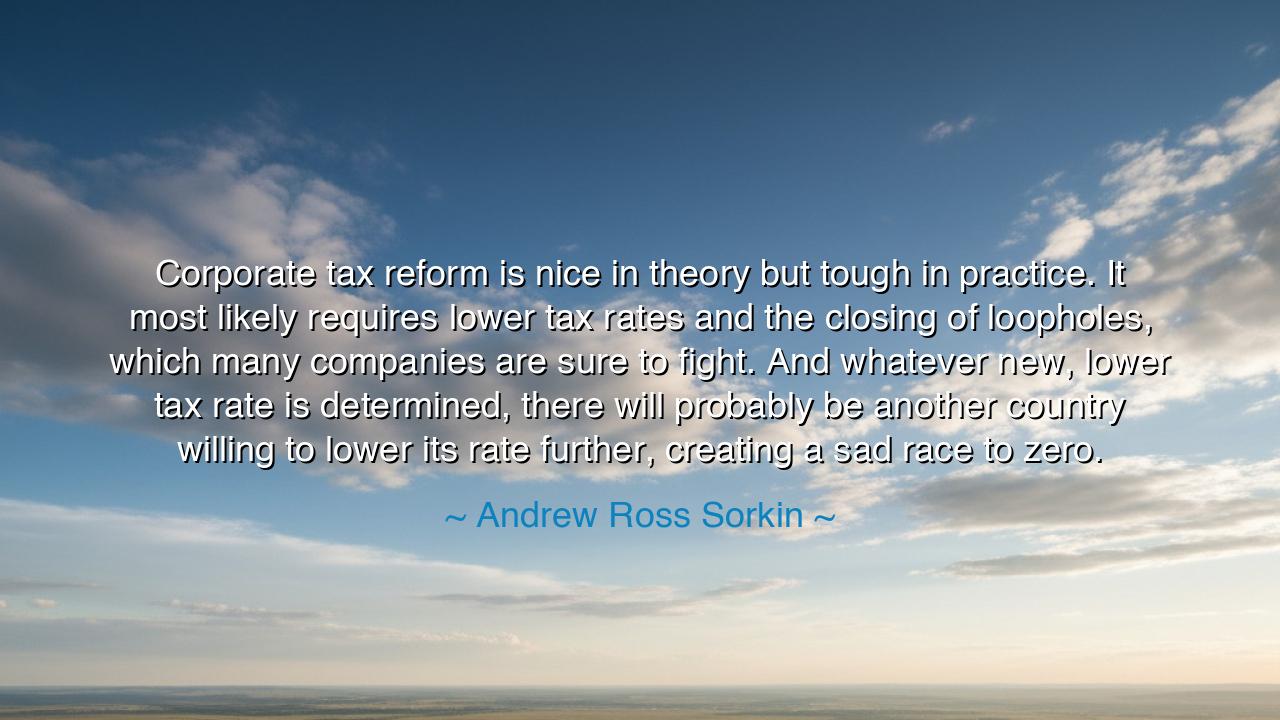
Corporate tax reform is nice in theory but tough in practice. It
Corporate tax reform is nice in theory but tough in practice. It most likely requires lower tax rates and the closing of loopholes, which many companies are sure to fight. And whatever new, lower tax rate is determined, there will probably be another country willing to lower its rate further, creating a sad race to zero.






Hearken, children of reflection, to the words of Andrew Ross Sorkin, who declares: "Corporate tax reform is nice in theory but tough in practice. It most likely requires lower tax rates and the closing of loopholes, which many companies are sure to fight. And whatever new, lower tax rate is determined, there will probably be another country willing to lower its rate further, creating a sad race to zero." In these words lies a meditation upon human ambition, governance, and the intricate dance between law, commerce, and morality. Since the days of the ancients, the philosophers have warned that the pursuit of wealth and advantage often collides with the principles of justice and communal well-being.
The ancients understood that the organization of society requires balance between authority and the private ambitions of its citizens. Aristotle wrote that the polis thrives when rules are structured not merely to limit excess, but to channel human desire toward the common good. Sorkin’s observation—that tax reform, though appealing in theory, faces fierce opposition in practice—mirrors this timeless truth: laws that seem righteous on parchment are often tested by the ingenuity, and sometimes the cunning, of those who seek to evade them.
Consider the historical example of mercantile Venice, where the Doge and his council imposed taxes on trade to fund public works and defense. Yet wealthy merchants, skilled in the arts of negotiation and loophole, often found ways to minimize their contributions. This struggle between authority and wealth, between principle and pragmatism, echoes Sorkin’s depiction of corporate actors resisting tax reform, seeking to preserve advantage while challenging the dictates of law. The dynamics remain unchanged across centuries, a testament to the persistent tension between justice and self-interest.
The quote also highlights the global dimension of economics. When Sorkin warns of other countries willing to lower tax rates, he reveals the interdependence of human enterprise: no kingdom or nation exists in isolation. The ancients, though unaware of modern globalization, observed similar patterns in trade among city-states, where one polity’s advantages could be eroded by the policies of another. The sad race to zero is thus an enduring truth: the pursuit of gain, unchecked by wisdom or cooperation, can erode collective prosperity.
Yet the observation is not merely a lament; it is a call to vigilance, strategy, and moral discernment. Sorkin reminds us that good intentions—here, corporate tax reform—must be tempered by awareness of human behavior, the complexities of negotiation, and the structural realities of competition. History teaches that law, policy, and regulation are tools, but their effectiveness depends upon enforcement, fairness, and the willingness of society to uphold them against resistance.
From this reflection emerges a timeless lesson: reforms, whether fiscal, moral, or social, demand both vision and pragmatism. One must anticipate opposition, understand incentives, and recognize the broader network of influence in which rules operate. A measure of success lies not in idealistic purity, but in the careful crafting of systems resilient enough to endure human ambition, ingenuity, and rivalry.
Practical actions follow naturally. In matters of governance, commerce, or personal conduct, study the incentives and likely behaviors of others. Anticipate resistance, plan for compromise, and seek solutions that balance fairness with practicality. Avoid simplistic thinking that assumes the power of theory alone; test principles against the realities of human action, just as rulers, philosophers, and merchants have done across the ages.
Remember, children of the ages, that the tension between vision and execution is eternal. Andrew Ross Sorkin’s words illuminate the enduring truth that reform is never simple, that ambition and strategy collide across borders and eras, and that wisdom lies in anticipating human behavior while pursuing the common good. In understanding these dynamics, we cultivate prudence, foresight, and the resilience necessary to guide society—and ourselves—through the complexities of justice, commerce, and morality.






AAdministratorAdministrator
Welcome, honored guests. Please leave a comment, we will respond soon